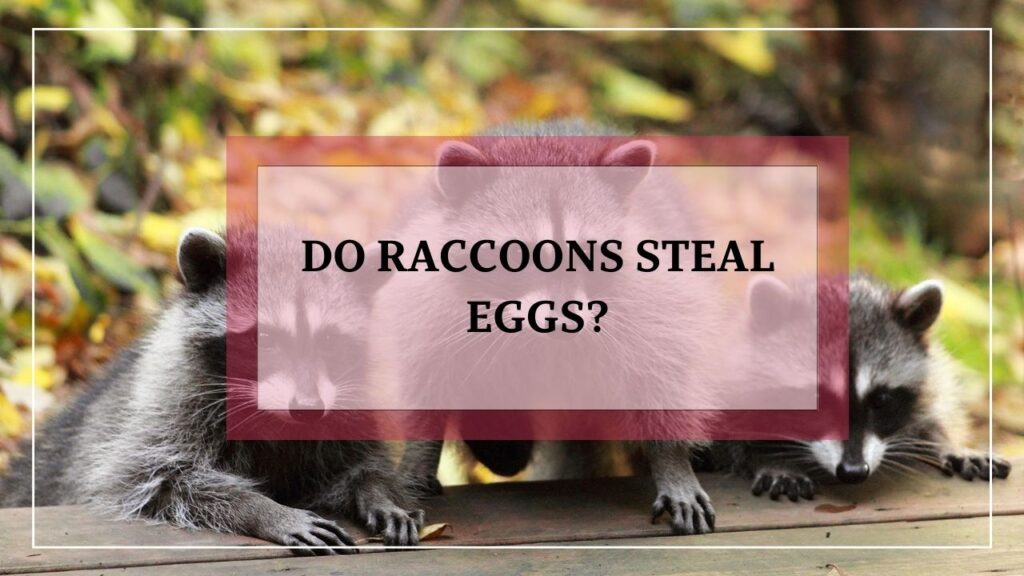Raccoons are known for their intelligence and curiosity, which often leads them to explore human habitats and food search. One common behavior that has been observed in raccoons is their tendency to steal eggs from backyard chicken coops.
Raccoons are known to steal eggs from bird nests and other sources. They are opportunistic feeders and will eat a wide variety of foods, including eggs. This can be a problem for farmers, birders, and others who are trying to protect eggs and young birds.
This behavior not only causes frustration for chicken owners, but it can also put the raccoons at risk of injury or death.
In this blog post, we will explore the reasons why raccoons steal eggs, the potential risks and damage caused by this behavior, and ways to prevent raccoons from accessing your chicken coop.
Do Raccoons Eat Eggs Or Just Steal Them?
Raccoons are known to eat eggs, both from wild birds and from domestic chickens. They have strong front paws and sharp claws that allow them to easily crack open eggs and gain access to the yolk and egg white inside.
Do Raccoons Steal Chicken?
Raccoons can steal chickens, especially if the chickens are kept in an unprotected coop or area. To protect chickens from raccoons, it is important to keep them in a secure coop or pen and to take other precautions, such as removing potential food sources and securing openings.
Why Do Raccoons Steal Eggs And Chicken?
- Raccoons are known to be opportunistic feeders. They can easily raid chicken coops and nests due to their dexterity and problem-solving abilities. Additionally, raccoons may steal eggs and chickens for food if natural food sources are scarce.
- Raccoons are also known to be very curious animals and they will investigate anything new in their environment, if they find something they can eat they will take it.
- Another reason raccoons may steal eggs and chickens is if they have a den nearby and they are feeding their young. They will take whatever food they can find to provide for their family.
- Raccoons are also nocturnal animals and they are active at night, this is the time when chicken coops and nests are unguarded and that’s why they take advantage of it.
How To Prevent Raccoons From Stealing My Eggs?

Here are a few steps that you can take to prevent raccoons from taking your eggs away:
1. Secure The Coop
Make sure that the chicken coop is properly secured with sturdy locks and latches. Raccoons are clever animals and can figure out how to open simple latches, so it’s important to use robust locks that they cannot manipulate.
2. Fence The Area
Building a fence around the coop and the surrounding area can deter raccoons from entering. Make sure the fence is at least 6 feet tall and bury it at least 1 foot deep to prevent raccoons from digging underneath it.
You Might be Interested in: Can Bobcats Climb Fences? And How To Prevent It?
3. Remove Potential Food Sources
Raccoons are attracted to areas where food is readily available, so make sure to remove any potential food sources such as fallen fruit, compost, or unsecured trash cans.
4. Use Motion-Activated Lights Or Alarms
Motion-activated lights or alarms can be used to deter raccoons from stealing eggs by startling them when they approach the area where the eggs are located.
The bright lights or loud noise can scare the raccoons away, making it less likely that they will attempt to steal the eggs. Additionally, motion-activated lights can also be used to illuminate the area, making it more difficult for raccoons to sneak in undetected.
Note: It's important to note that these devices are not a permanent solution and raccoons may become accustomed to the lights or alarm over time.
5. Remove Nesting Sites
Raccoons often will make their dens or nesting sites close to the area they found food, so if you remove the den, they will have less incentive to stay around and steal eggs.
Use predator urine or scent repellent: Some raccoons may be deterred by the scent of predators such as foxes or coyotes. You can buy predator urine or scent repellent and place it around the coop to discourage raccoons from approaching.
6. Use A Coop Cover
A coop cover can help prevent raccoons from stealing eggs by creating a barrier that the raccoons cannot easily access.
The cover can be made of sturdy materials such as wire mesh or heavy-duty plastic and should be securely attached to the coop to prevent the raccoons from being able to tear it off or push their way in.
Some coop covers also feature locking mechanisms to make it even more difficult for raccoons to gain entry.
Note: It's important to note that raccoons are wild animals and it's illegal to trap and relocate them without proper permits in some states, so it's best to consult with your local wildlife agency before taking any action.
The Bottom Line
As always, we love to summarise our articles. Raccoons are known to steal eggs from bird nests and other sources, as they are opportunistic feeders and will eat a wide variety of foods, including eggs. This can be a problem for farmers, birders, and others who are trying to protect eggs and young birds.
Raccoons steal eggs and chickens for food if natural food sources are scarce, for curiosity, or for feeding their young.
To prevent raccoons from stealing eggs, you can secure the chicken coop with sturdy locks, build a fence around the coop, remove potential food sources, use motion-activated lights or alarms, remove nesting sites, use predator urine or scent repellent, and use a coop cover.

